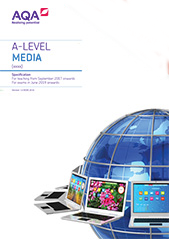Media language
In this section students will develop their knowledge and understanding of:
- how the different modes and language associated with different media forms communicate multiple meanings
- how the combination of elements of media language influence meaning
- how developing technologies affect media language
- the codes and conventions of media forms and products, including the processes through which media language develops as genre
- the dynamic and historically relative nature of genre
- the processes through which meanings are established through intertextuality
- how audiences respond to and interpret the above aspects of media language
- how genre conventions are socially and historically relative, dynamic and can be used in a hybrid way
- the significance of challenging and/or subverting genre conventions
- the significance of the varieties of ways in which intertextuality can be used in the media
- the way media language incorporates viewpoints and ideologies.
Enabling ideas to support the study of media language
The content below identifies the enabling theories, key ideas and terms that constitute key theoretical aspects of media language. Students will develop knowledge and understanding of the following theoretical aspects.
Semiotics
Semiotics:- Sign
- Signifier
- Signified
- Dominant signifier
- Icon
- Index
- Code
- Symbol
- Anchorage
- Ideology
- Paradigm
- Syntagm.
- Signification
- Denotation
- Connotation
- Myth.
Narratology
Narratology:- Narrative Codes
- Narration
- Diegesis
- Quest narrative
- 'Character types'
- Causality
- Plot
- Masterplot.
- Narrative structure
- Equilibrium
- Disruption
- New equilibrium.
Genre theory as summarised by Neale
- Conventions and rules
- Sub-genre
- Hybridity
- Genres of order and integration
- 'Genre as cultural category'.
Structuralism
Lévi-Strauss' ideas and theories on structuralism:- Binary oppositions
- Mytheme
- Cultural codes
- Ideological reading
- Deconstruction.
Postmodernism
Postmodernism:- Pastiche
- Bricolage
- Intertextuality
- Implosion.
- Simulacra
- Simulation
- Hyperreality.
